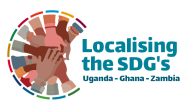Localizing SDGs In High Schools in Uganda
Namataba, UGANDA: On 18th June 2022, Open Space Center, under the Localizing SDGs project, partnered with the National Prefects’ Council for the Annual High School Leadership Workshop hosted by Limkokwing University of Creative Technologies in Namataba – Mukono. The workshop was held under the theme: Enlightening High School Leaders’ Role in Enhancing the Development of Sustainable Development Goals. The event was attended by over 80 student leaders from the schools of Code High School, Mukono; Kings High School, Nakifuma; Modern Sec School; St Lawrence S.S Sonde; Namataba S.S; Dynamic Secondary School; Mpoma Girls’ School; and Mukono Islamic S.S. Previously, Open Space ran the “SDGs in Reality – Uganda,” a comprehensive youth mentorship program in secondary schools and local communities designed to provide information to secondary school students to facilitate the creation of an endless chain of social change to meet the SDGs. Under this program was the Inter-School SDG Awareness Debate Championship – a Ugandan secondary school debate program running in the central region, attracting a total of fifteen schools over its two years of existence. This consequently resulted in the production of several pro-active SDG ambassadors in the project schools, contributing to the localization of the SDGs and the development of position papers that portray the debate cases prepared by the students, among other things. The Youth SDGs Symposium was under the program, too – an inspirational gathering dedicated to celebrating, showcasing, and mobilizing youth action around the SDGs. Organized under the theme “Delivering Together,” the Symposium brought together students from high schools and universities, youth leaders, youth organizations, and key stakeholders actively involved in the implementation, monitoring, and promotion of the sustainable development agenda, including the Government of Uganda, development partners, academia, media, private sector, policymakers, and civil society. This year, in partnership with Crossing Borders Denmark & CISU, Open Space is implementing the project Localizing SDGs. This platform focuses on the crucial task of localizing the UN Global Goals (SDGs) at the grassroots level. The overarching aim of the project is met through; mobilizing and engaging our direct target groups (youth) by enabling them to create and take ownership of localizing the SDGs through grassroots activities; facilitating the building of synergies, good practices, and success stories about localizing the SDGs through a collaborative platform. At the Annual High School Students’ Leadership workshop, Open Space conducted interactive sessions with the school leaders on how they can contribute to realizing the SDGs in their capacity as student leaders in their schools. These sessions inspired the leaders to think creatively of ways to activate the SDGs in their schools. Have you also read Localizing SDGs In High Schools in Uganda ‘Sesaamu’ Sessions with Community Leaders to Localize SDGs in Uganda. Update: Digital training week under Localizing SDGs in Ghana, Uganda and Zambia project Update: leave no one behind – Localising the SDGs in Ghana And this is how we localize the SDGs! When people on the grassroots level can influence policymakers Contact us if you have any question Please enable JavaScript in your browser to complete this form.Name *FirstLastEmail *Comment or Message * Submit
Localizing SDGs In High Schools in Uganda Read More »






